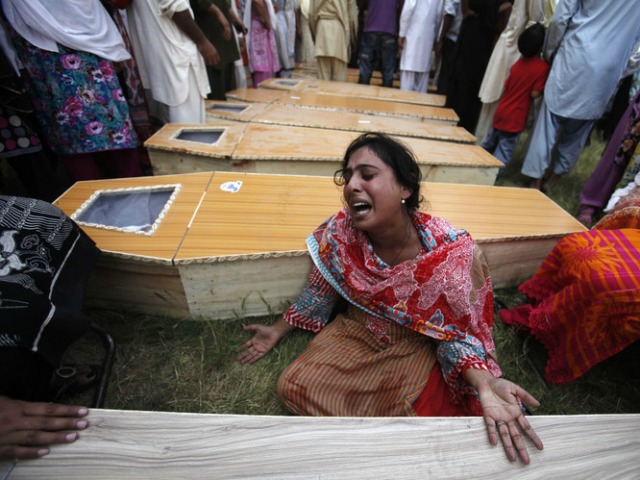
On Thursday, Breitbart News reported on recent attacks on Christians in the Middle East and wondered why it took an attack on an Anglican church for Archbishop of Canterbury Justin Welby to finally condemn the violence. Pope Francis has consistently spoken about and condemned the slaughter of Christians in the Middle East, but where are the politicians and, more importantly, the American churches?
Attacks last weekend brought this important story to the front page. Two suicide bombers blew up an Anglican church last Sunday in Pakistan and killed over 85 worshipers. On September 21, 10 to 15 members of the radical Islam terrorist group al-Shabaab stormed an Israeli-owned mall and targeted non-Muslims, killing at least 61 civilians; the death toll is expected to increase once all the bodies are recovered inside.
The fact is this has been going on for decades. Christianity was born in the Middle East and it is literally dying out in the region at the hands of radical jihadists. As Paul Marshall said in his FOX News op-ed, the Taliban and other radical groups only care about religion. Gender, race, ethnicity, and age do not matter. This could lead to the extinction of Christians in the Middle East.
Even leaving aside the attacks on minorities in Syria and Iraq, and the massive killings in Nigeria, Christians in Egypt have recently suffered what my colleague Sam Tadros regards as the worst violence since 1321, under the Mamluks.
The situation is so serious that English historian Tom Holland fears that we are now seeing the extinction of Christianity and other minority faiths from the Middle East.
To some, it is similar to what happened to the Jews in Europe.
The Christian community is also largely silent. Jonathan Sacks, former Chief Rabbi of the United Kingdom and Commonwealth has compared Christians’ fate with that of Jews in Europe, and, like many others in these days, quotes Rev. Martin Luther King, Jr.: ‘In the End, we will remember not the words of our enemies, but the silence of our friends.’
More than half of the 800,000 Christians in Iraq have fled since 2003. International human rights lawyer Nina Shea testified in front of Congress:
…In August 2004…five churches were bombed in Baghdad and Mosul. On a single day in July 2009, seven churches were bombed in Baghdad…The Archbishop of Mosul, was kidnapped and killed in early 2008. A bus convoy of Christian students were violently assaulted. Christians…have been raped, tortured, kidnapped, beheaded, and evicted from their homes…”
In August, Coptic Christians were under assault in Egypt and blamed for President Morsi’s overthrow and downfall of the Muslim Brotherhood.
In the span of just three days, between August 14 and 16, 38 Churches were destroyed; 23 were vandalized. Fifty-eight Coptic homes were burned and looted. Eighty-five Copt-owned shops, 16 pharmacies and 3 hotels were demolished. Six Christians were killed; seven Copts were kidnapped.
Kirsten Powers at The Daily Beast reports author Lela Gilbert’s Jewish friends and neighbors in Israel are not shocked by the attacks on Christians, but they are shocked American churches are not speaking out. Powers agrees:
As they should be. It is inexplicable. American Christians are quite able to organize around issues that concern them. Yet religious persecution appears not to have grabbed their attention, despite worldwide media coverage of the atrocities against Christians and other religious minorities in the Middle East.
Powers pointed out Rep. Frank Wolf (R-VA) did ask over 300 Catholic and Protestant leaders why they are not speaking out.
“Can you, as a leader in the church, help?” he wrote. “Are you pained by these accounts of persecution? Will you use your sphere of influence to raise the profile of this issue–be it through a sermon, writing or media interview?”
There have been far too few takers.
In his letter challenging U.S. religious leaders, Wolf quoted Lutheran pastor Dietrich Bonhoeffer, who was executed for his efforts in the Nazi resistance: “Silence in the face of evil is itself evil. Not to speak is to speak. Not to act is to act.”
That pretty well sums it up.
Powers said last year Wolf sponsored legislation with Rep. Anna Eshoo (D-CA) that would “create a special envoy at the State Department to advocate for religious minorities in the Middle East and South-Central Asia.” It passed the House but failed in the Senate. It was reintroduced in January and is currently stuck in the Senate.

COMMENTS
Please let us know if you're having issues with commenting.